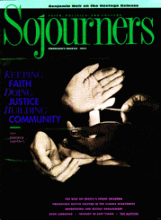The lectionary readings that correspond to the Sundays of February and March take us through pre-Lenten reflections to the middle of that penitential season. Various biblical themes emerge in the texts for these weeks and play like a symphony of spiritual meditations. They range from the prophetic vocation, lived in ancient times and today, to God's transcendence; from the divine mandate of forgiveness, to God's Word that unerringly attains its end and the Messiah's roadway toward Calvary and the resurrection.
Reflection on the Word of God as presented to us from week to week never reaches a finality. There are always further depths to plumb; God's living revelation is as limitless as the divine.
May our journey in these weeks from pre-Lent through the time of preparation for resurrection Sunday nurture and sustain us in our efforts to know and follow Jesus.
February 2
Jeremiah 1:4-10; 1 Corinthians 13:1-13; Luke 4:21-30
This Sunday's Hebrew scripture and the reading from Luke's gospel seem particularly appropriate for people of faith today in the United States. In both texts we find the phenomenon of prophetic vocation.
Jeremiah is called at a time when his nation has fallen into idolatry and faces the terrible prospect of exile. For some 40 years he exercises his ministry, through a time of hope (King Josiah's reform) and a time of despair (the Babylonian captivity). Jeremiah had the enormously unpopular vocation of warning the Jewish people of impending doom.
Read the Full Article

